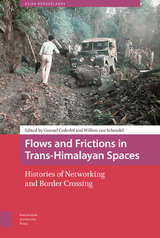3 books about Frictions

Continuous Pasts
Frictions of Memory in Postcolonial Africa
Sakiru Adebayo
University of Michigan Press, 2023
In Continuous Pasts, author Sakiru Adebayo claims that the post-conflict fiction of memory in Africa depicts the intricate ways in which the past is etched on bodies and topographies, resonant in silences and memorials, and continuous even in experiences as well as structures of migration. Adebayo argues that the post-conflict fiction of memory in Africa invites critical deliberations on the continuity of the past within the realm of positionality and the domain of subjectivity—that is to say, the past is not merely present; instead, it survives, lives on, and is mediated through the subject positions of victims, perpetrators, as well as secondary and transgenerational witnesses. The book also argues that post-conflict fiction of memory in Africa shows the unfinished business of the past produces fragile regimes of peace and asynchronous temporalities that challenge progressive historicism. It contends that, in most cases in Africa, the post-conflict present is beset with a tight political economy wherein the scramble for survival trumps the ability to imagine a just future among survivors—and that it is precisely this despairing disposition toward the future that the some writers of post-conflict fiction attempt to confront in their works. On the whole, Continuous Pasts shows how post-conflict fictions of memory in Africa recalibrate discourses of futurity, solidarity, responsibility, justice, survival, and reconciliation. It also contends that post-conflict fictions of memory in Africa provide the tools for imagining and theorizing a collective African memory. Each text analyzed in the book provides, in very interesting ways, an imaginative possibility and template for how post-independence African countries can ‘remember together’ using what the author describes as an African transnational memory framework.
[more]

Flows and Frictions in Trans-Himalayan Spaces
Histories of Networking and Border Crossing
Gunnel Cederlöf
Amsterdam University Press, 2022
Flows and Frictions in Trans-Himalayan Spaces traces movements and connections in a region known for its formidable obstacles to mobility. Eight original essays and a conceptual introduction engage with questions of networks and interconnection between people across a bordered landscape. Mobility among the extremely varied ecologies of south-western China, Myanmar and north-eastern India, with their rugged terrain, high mountains, monsoon-fed rivers and marshy lowlands, is certainly subject to friction. But today, harsh political realities have created hard borders and fractured this trans-Himalayan terrain. However, the closely researched chapters in this book demonstrate that these borders have not prevented an abundance of movements, connections and flows. Mobility has always coexisted with friction here, but this coexistence has been unsettled, giving this space its historical shape and its contemporary dynamism. Introducing the concept of the ‘corridor’ as an analytical framework, this collection investigates mobility and flows in this unique socio-political landscape.
[more]

Silicon Valley Imperialism
Techno Fantasies and Frictions in Postsocialist Times
Erin McElroy
Duke University Press, 2024
In Silicon Valley Imperialism, Erin McElroy maps the processes of gentrification, racial dispossession, and economic predation that drove the development of Silicon Valley in the San Francisco Bay Area and how that logic has become manifest in postsocialist Romania. Drawing on ethnographic fieldwork and archival research in Romania and the United States, McElroy exposes the mechanisms through which the appeal of Silicon Valley technocapitalism devours space and societies, displaces residents, and generates extreme income inequality in order to expand its reach. In Romania, dreams of privatization updated fascist and anti-Roma pasts and socialist-era underground computing practices. At the same time, McElroy accounts for the ways Romanians are resisting Silicon Valley capitalist logics, where anticapitalist and anti-imperialist activists and protesters build on socialist-era worldviews not to restore state socialism but rather to establish more just social formations. Attending to the violence of Silicon Valley imperialism, McElroy reveals technocapitalism as an ultimately unsustainable model of rapacious economic and geographic growth.
[more]
READERS
Browse our collection.
PUBLISHERS
See BiblioVault's publisher services.
STUDENT SERVICES
Files for college accessibility offices.
UChicago Accessibility Resources
home | accessibility | search | about | contact us
BiblioVault ® 2001 - 2024
The University of Chicago Press









